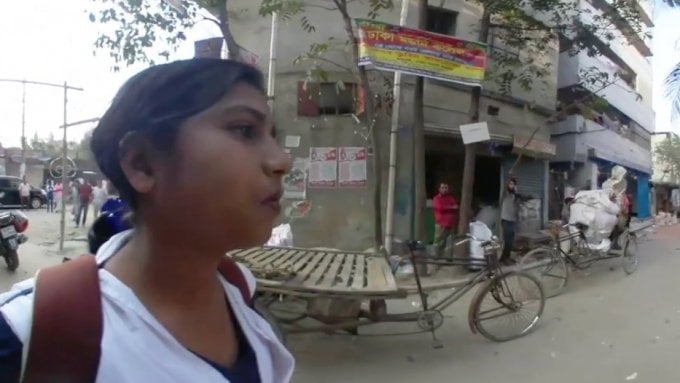
Read our 2023 annual report

Knowledge Hub
Thousands of women face violence and uncertainty on the streets of Bangladesh but an innovative programme aimed at lifting people from extreme poverty is creating hope for the future.
In many countries, it is women and girls who bear the brunt of economic struggle and inequality.
This is certainly true in Bangladesh, where the urban population is set to reach 79.5 million by 2028. While a lot of economic progress has been made in Bangladesh towards attaining middle-income status, there are widening inequalities and large numbers of urban poor being ‘left behind’ on the streets of the country's capital, Dhaka.
Referred to as 'pavement dwellers', these individuals live in the harshest of conditions - often beneath flimsy plastic sheets or under the open sky. They are often unskilled and poorly paid, have poor access to savings and credit, and limited social networks.
Many of these pavement dwellers are women, who face challenges around the care of their children and additional threats on the streets. Violence against women and girls is rampant, with women particularly vulnerable to exploitation and intimate partner violence.
Ethi is one of these women.
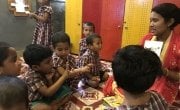
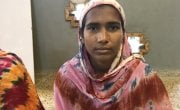

Ethi's story
Only twenty-two years of age, she has the presence of a much older woman when we meet her at one of Concern's state-of-the-art centres for pavement dwellers in the middle of crowded Dhaka.
Ethi grew up living on the streets of Dhaka and recalls being in constant fear for her safety.
"I lived in the open air on the street and tried to make a living selling clothes but the authorities would regularly move me along, hitting me with batons. I was afraid nearly all the time.”
With no access to shelter, healthcare, education, electricity, water or sanitation, survival is a daily struggle for pavement dwellers like Ethi. The majority are illiterate and as a result, they have no access to formal employment. Many work in low-paid, hazardous jobs such as rickshaw pulling, domestic work, sex work and waste collection. In this environment, malnutrition, poor health and water borne diseases are common.
Three years ago, Ethi was invited to join the Amrao Manush programme, which aims to lift pavement dwellers out of extreme poverty.
She now has a job in a hotel, where she prepares and mixes spices and grains in the morning for the hotel’s chefs, and can leave her six-year-old son in the Amrao Manush daycare centre while she's at work.
She can also leave her valuables in one of the centre’s lockers and has access to parenting training, psychosocial support and medical services - supports that Ethi says have changed her life.
“I feel much better, more secure. I know now that my son will be educated. He will get a job and I dream of much better days ahead.”
A.K.M Musha, Concern's Bangladesh Country Director, explains that the team began to support the centres in 2008 and they have been designed for the specific needs of the users.
“We spent nine months designing the programme. Every night, we came out on to the streets to ask the pavement dwellers what they needed. One night, I met a family who had lived on the streets for thirty years. I asked them what they needed and they gave us the solutions. They said on the street we have no toilets, no place to cook, no clean water, nowhere to leave our children when we work and nowhere to leave our valuables.”
As well as the practical supports, Musha believes that a huge priority of the centre is to rebuild the confidence of those who have been living on the streets and help them to work towards creating a better life for themselves and their family.
“When we meet these individuals, they have no confidence, no aspirations. We have to spend a lot of time building hope. You can’t solve this problem overnight but we are making good progress.”
Falljan's story
Falljan, a 45-year-old single mother from Bulla, was losing hope when she came across the centres four years ago.
Wrapped in a vivid orange, red and green shawl, she reveals that she enjoyed regular life as a housewife until her husband left her for another woman. With two children to take care of and no income or support from her family, Falljan fell into extreme poverty.
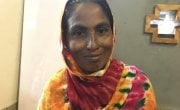

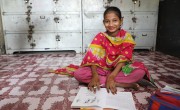
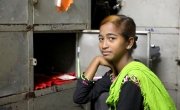
She ended up living and sleeping in Bangladesh’s largest railway station, Kamlapur, where she had a third child. Fulljan had been living at the station for four years with her three children when she was discovered by Concern staff and taken into the pavement dweller programme.
Fulljan, like her friend Ethi, now works in a hotel in the early morning preparing and mixing spices for the hotel’s chefs. She enjoys the job and knows that her three children aged ten, five and three are well looked after in daycare and at school in the centre.
Concern now runs seven pavement dweller centres in Dhaka. Apart from providing livelihood training and grants, basic medical services, daycare and adult education, the pavement dweller programmes also give the users of the centres an address and, in the case of many, allows them to be able to get birth certificates for their children.
Health support is also provided, including full immunisation against ten different diseases and contraceptive advice.
After a tough struggle, the future is now looking bright for women like Fulljan.
"I can work now knowing my children are safe. That makes all the difference.”
Support our work
You can help us to support the world’s poorest and most vulnerable people by donating today.
Our impact in 2023
people reached through our emergency response
people reached through our health interventions
people reached through our livelihoods programmes


